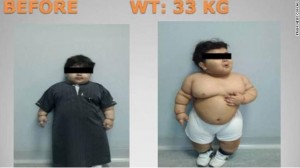
When you hear the story of a 2-year-old boy believed to be the youngest person in the world ever to have bariatric surgery, it’s very easy to “point a judgmental finger,” as one mom said to me.
“Wasn’t there anything else the parents could do besides such a serious surgery at such a young age?” parents will ask.
But then you hear the story of now 18-year-old Maria Caprigno, who weighed 443 pounds when she was just 14.
“I was gaining 40 pounds a year,” said Caprigno, in between classes at Bridgewater State University in Massachusetts. “They told me unless something drastic happened, I would not see my 18th birthday.”
Listening to Caprigno, it becomes clear that the decision by the boy’s parents — and what they did or did not do before the surgery — is not so black and white.
And as parents grapple with the option of early surgical intervention for childhood obesity, they also must examine whether it’s only their child’s health on the line or if appearance and social standards are influencing these decisions too.
The boy, from Saudi Arabia, weighed 79 pounds by the age of 2, and suffered from severe sleep apnea which caused him to stop breathing while asleep.
After two different attempts to control the boy’s weight through dieting reportedly failed, doctors decided to perform what’s called a laparoscopic sleeve gastrectomy, which involves permanently removing 60 to 85% of the stomach and restricting food intake.
Dr. Jennifer Shu, a pediatrician in Atlanta, said such a procedure should be a last resort, and only after close monitoring and dieting have been attempted and proven to be unsuccessful.
Without knowing the details of this particular case, she said that if doctors had not performed the surgery, the boy could have faced physical problems such as pain, injuries and bowed legs, heart disease and diabetes down the road and even death, from the lack of oxygen caused by the sleep apnea.
“I think what (the doctors) are trying to say is this kid may not live without the surgery or without reversing that weight gain,” said Shu, CNNHealth’s Living Well expert doctor who is also a mother of two.
Shu says the current recommendation is to wait until the child is done growing or close to it, which is around 13 for girls and 15 for boys before considering bariatric surgery.





Comments are closed.